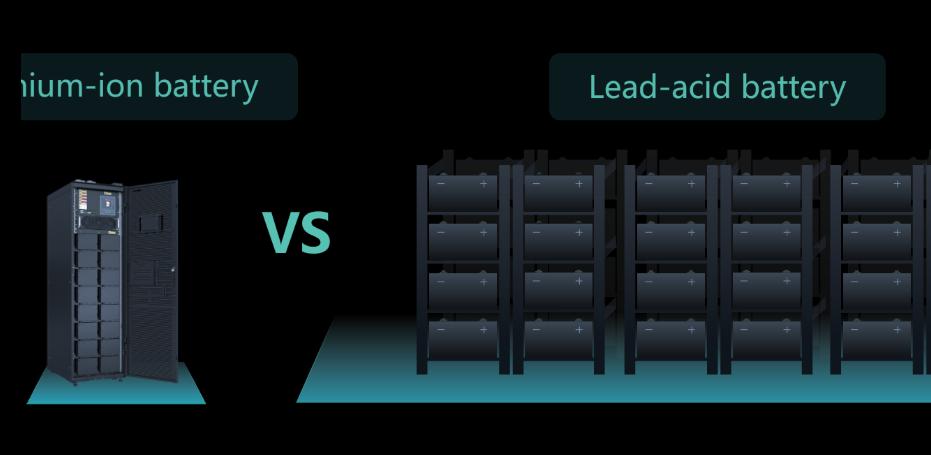
When it comes to choosing an uninterrupted power supply (UPS) for critical applications, the type of battery makes a significant difference. Traditionally, lead-acid batteries have been the go-to option for many. However, the emergence of lithium UPS systems is revolutionizing the industry. These advanced batteries offer several compelling benefits that are hard to ignore. Understanding these advantages can help you make an informed decision about your backup power solutions.
Longer Lifespan and Durability
How Lithium Batteries Outlast Lead-Acid Batteries
Lithium batteries are renowned for their longevity compared to lead-acid counterparts. Typically, a lithium UPS system has a lifespan of 10 to 15 years, while lead-acid batteries usually last between 3 to 5 years. One of the primary reasons for this extended lifespan is the advanced battery management systems integrated into lithium batteries. These systems meticulously monitor and control the charge and discharge cycles, ensuring optimal performance and longevity.

Reduced Frequency of Battery Replacements
With a longer lifespan comes the benefit of less frequent replacements. Organizations using lead-acid batteries often face the headache of regular replacements, which can disrupt operations and lead to increased downtime. On the other hand, lithium UPS systems reduce the frequency of replacements, ensuring more consistent and reliable power for critical applications. This durability translates to higher system availability and reliability over years of operation.
Enhanced Efficiency and Energy Performance
Better Charge and Discharge Efficiency in Lithium UPS
Lithium batteries excel in terms of charge and discharge efficiency. They can be charged to full capacity much faster than lead-acid batteries, which is crucial in situations that demand quick turnaround times. Moreover, lithium UPS systems can deliver higher power output without degrading the battery’s health, thanks to their superior chemistry and design. This results in a more efficient use of stored energy.
Reduced Energy Loss and Lower Operating Costs
Energy efficiency goes beyond just fast charging. Lithium UPS systems have a lower rate of energy dissipation during both charging and discharging cycles. This reduction in energy loss means that more power is available for the actual load rather than being wasted. Consequently, reduced energy loss leads to lower operational costs and more sustainable power usage, providing both economic and environmental benefits.
Environmental and Sustainability Benefits
Lithium Batteries: More Environmentally Friendly Than Lead-Acid
From an environmental perspective, lithium batteries are more sustainable than lead-acid batteries. The production and disposal processes of lead-acid batteries involve toxic chemicals and hazardous materials, posing a significant environmental risk. Conversely, lithium batteries have a cleaner production process and contain fewer harmful substances. This makes them a more environmentally friendly option for backup power solutions.
Recycling and Disposal Advantages of Lithium Batteries
Lithium batteries also have better recycling and disposal prospects. Lead-acid batteries, if not properly disposed of, can lead to soil and water contamination. Fortunately, the recycling programs for lithium batteries are more advanced, allowing for efficient recovery of materials and reducing landfill waste. This closed-loop recycling process ensures that valuable resources are reused, minimizing the environmental footprint.
Compact Design and Space Efficiency
How Lithium UPS Systems Save Space in Critical Environments
Space efficiency is another notable advantage of lithium UPS systems. These batteries boast a higher energy density, meaning they can store more energy in a smaller volume. This results in a more compact design that is ideal for environments where space is at a premium. Data centers, hospitals, and industrial facilities can greatly benefit from the reduced footprint of lithium UPS systems.
Reducing the Footprint for Easier Installation
A compact design not only saves space but also simplifies installation procedures. Conventional lead-acid battery setups often require cumbersome and extensive installation processes due to their size and weight. In contrast, lithium UPS systems are lighter and more agile, facilitating quicker and easier installations. This streamlining not only saves time but also reduces labor costs and associated installation expenses.

Cost Efficiency: Is Lithium UPS Worth the Investment?
Lower Long-Term Maintenance and Operational Costs
Lithium UPS systems, despite their higher initial cost, offer significant long-term benefits. One of the most pronounced advantages is the lower maintenance and operational costs. Lead-acid batteries demand regular maintenance to ensure ongoing performance, involving time, labor, and financial resources. Lithium batteries, with their robust design and technology, require less upkeep, translating to reduced long-term costs.
Initial Investment vs. Total Cost of Ownership Over Time
Evaluating the total cost of ownership (TCO) provides a clearer picture of lithium UPS systems’ value. While the initial investment may be higher than that of lead-acid batteries, the extended lifespan, efficiency, and reduced maintenance needs contribute to a lower TCO over time. Businesses can achieve significant cost savings by switching to lithium UPS systems, making the initial expenditure a worthy investment.
Conclusion
In summary, Lithium battery UPS systems offer numerous advantages over traditional lead-acid batteries. From longer lifespans and enhanced efficiency to better environmental sustainability and space-saving design, the benefits are compelling. While the initial investment may be higher, the reduced maintenance and operating costs make lithium UPS a smart, long-term choice. For organizations seeking reliable and efficient backup power solutions, lithium UPS systems stand out as the superior option.